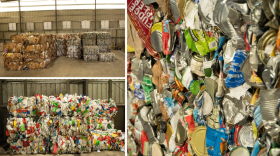The Michigan Environmental Council wants to put expansions for Michigan’s bottle bill on the 2026 ballot.
The council is talking to industry stakeholders like retailers, bottle producers, and other advocates for the environment about what expanding the bill should entail. The council wants to change what containers residents can return and how they redeem them.
The council has been working on reforms for the 1976 bill for over a decade, but next year would be a fitting time to update it, said Conan Smith, the council’s president and CEO.
“2026 happens to be the 50th anniversary" of the bottle bill, he said. “And that just rings true to me as the moment where we can take a signature national policy and update it for the modern age.”
The council wants more kinds of containers to be eligible for return, like water or sports drink bottles. And it wants the state to use more money from unredeemed deposits to invest in the recycling system. Right now, 25% of that money goes to retailers, while the other 75% funds environmental cleanups across the state.
A 2023 report by NextCycle recommended making both of these changes, as it would make redemption easier for consumers.
The council also wants Michigan to adopt a universal redemption policy. That means people would be able to return clean containers at any retailer, regardless of whether that particular brand is sold there.
Other states, like Oregon, have already made similar updates. But in Michigan, retailers are the only place consumers can return their bottles for deposit money. That means any changes to the bottle bill will fall on retailers to implement.
The process needs to be updated, but increasing how much retailers have to accept isn’t the solution, said Drew Beardslee, vice president for government affairs at the Michigan Retailers Association, an industry group.
“When we talk about expansion, we don't see that as the answer, because that's going to create new issues for retailers and consumers alike,” he said.
The expansions as proposed would mean a larger volume of bottles for retailers to process. Retailers wouldn’t be able to handle that big of a change, Beardslee said.
And more eligible bottles means consumers would pay more for those beverages up front. Consumers pay an extra 10 cents per eligible bottle when they buy beverages at the store, then get that dime back when they return empty containers.
The 2023 Next Cycle report also recommended making changes so redemption centers can operate in the state, giving consumers more options for where they return their bottles. The retailers association supports those kinds of changes, Beardslee said.
“We'd like to see an expansion of options for consumers about where they can take their cans,” he said. “I mean, nobody likes standing there feeding them one by one through the machine.”
Return rates plummeted from 88.7% in 2019 to 75% in 2023. That’s thanks to the COVID pandemic. And a 2024 report by the Michigan Sustainable Business forum found that Michigan residents threw out 1.3 billion containers that could have been returned in 2023.
Smith and the environmental council hope expansion will mean an increase in bottle deposit returns.
But bottle deposits don’t have to be the solution, Beardslee said. He suggested focusing on curbside recycling. That’s where many Michigan residents are throwing their returnable bottles instead, according to the 2024 report.
But the process to update a law that citizens voted in takes a lot of work, Beardslee said.
“This conversation keeps coming up in part because the lift involved is quite high,” he said. The Legislature can only update the law with a 75% majority vote. Otherwise, Michigan voters have to approve it as a ballot initiative.
The environmental council would need to collect over 350,000 signatures to qualify for the 2026 ballot.
It’s also difficult to find a consensus among stakeholders about what expansions should be included in the proposal, Smith said.
“There are a lot of competing interests that are in tension,” he said. A three-quarter majority in the legislature is unlikely, he said.
“But we [have] still got to try and see if that consensus exists,” Smith said. The council wants to try again, but is ready to gather signatures if needed, he said.
“We're going to take one final shot, and then we're going to let the citizens have their say.”






